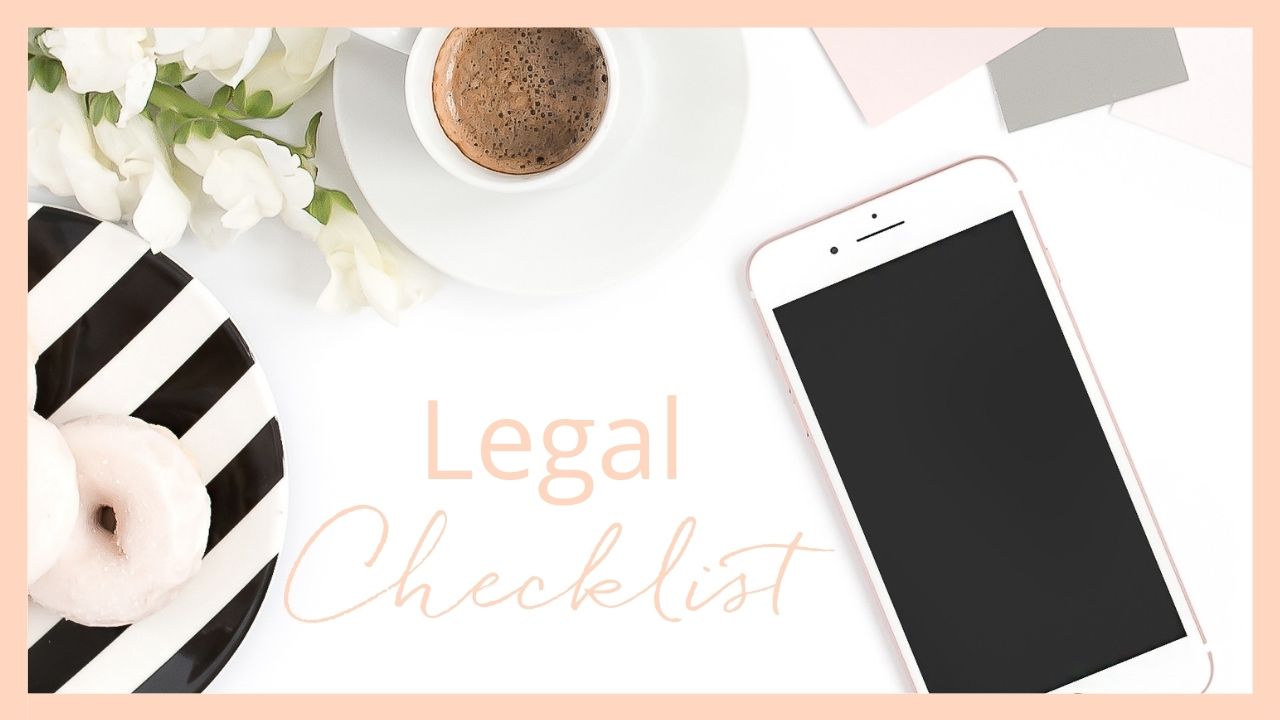Every day, I talk to coaches, consultants, and other online business owners who are working SO hard to scale their business, hit those $10k or $20k months, and are doing EVERYTHING they can to get more eyes on their business. But the one thing that is SO often brushed aside, overlooked, or assumed to be “not a big deal” can end up crushing dreams faster and harder than anything else in this business: LEGAL.
Building a business is like building a house – sure, the interior design and décor is more “fun” just like the social media strategy, photoshoots, and branding are more fun in online business. But the foundation of the house is also the most important – if there’s a problem with the foundation, you can bet the house isn’t going to last long. Same with legal protection in your business. You need to make sure the foundation is good, so as you’re building, you’re building on something solid, and you don’t need to keep questioning, worrying, or wondering if what you’re doing is actually legit.
Here’s a quick rundown of the top 5 illegal mistakes I see online businesses making.
(Want the full list? CHECK IT OUT HERE.)
- You Don’t have an ACCURATE Privacy Policy on your Website & Opt-In Pages
If you’re collecting any kind of personal information from people (name, email address, billing/purchase info, or even just the “contact” tab on your website) a privacy policy is legally required to be on BOTH your website and ALL your opt-in or landing pages. The privacy policy must:
- Be complete, meaning it has to include everything required by the FTC
- Drafted by an attorney in the online space
- GDPR compliant (yes, even if you’re located in the U.S.!) and
- Must be accurate for your business – meaning, it must state ALL the ways you personally collect information in your business (and yes! You must update if you add things like Facebook pixels, etc.)
Once the privacy policy is complete, you’ll need to put it in the footer of all your websites, and in the footer of any and all landing pages, opt-in pages, purchase pages – anywhere you collect information from people. (Download my full guide here to see examples!)
Need a privacy policy?? I’VE GOT YOU COVERED HERE.
- You’re accidentally using someone else’s business name and/or trademark
If you started your business without doing some serious research on the business name/course name/product name you want to use, there’s a chance you may be infringing on someone else’s rights, even if you didn’t do it on purpose! Why? If someone else was using the name first (even if you didn’t copy on purpose, AND YES even if they haven’t registered their name as a trademark with the US Patent & Trademark Office) you won’t be able to use the mark if your use is remotely confusing to their use. Meaning, if you’re in similar markets, the names are very similar, or a consumer could otherwise confuse one business or product for the other, you’ll likely be out of luck as soon as the other person realizes you’re using the name.
(And before you ask – if you’re in the U.S., no, registering the mark before the other person will not grant you any superior rights. If you do register the mark before they do, but they started using the mark in their business first, they’ll still have priority to continue using the mark, and will likely object to your trademark registration.)
- Using #sponsored and #ad hashtags incorrectly
Like testimonials, the FTC also heavily regulates influencer marketing and sponsored content/endorsements. If you’re paid to post content, given something for free, or otherwise have any sort of material relationship with the brand you’re posting about, the hashtags #sponsored and/or #ad on Instagram MUST be in the very beginning of your post, before the “more” button.
This is important because the FTC requires it to be very clear and easy for all consumers to see there’s a material relationship between you and the brand/person you’re posting about, so the consumer can factor that in, as they’re deciding whether or not to purchase something you’ve posted about. If the hashtags are below the “more” button, a consumer may not click “more” and never see that it was a sponsored post…which can mean you’ve exposed yourself to false or misleading advertisement charges.
- Using a Client Agreement Someone Gave You
THE most important document to have when you start working with clients is your Client Agreement. This is the ONLY document that will help you if there’s a disagreement (or lawsuit) between you and a client, so you need to make sure if says the right things, is specific to your agreement with that client, and actually protects you and your business.
The #1 thing NOT to do, that I see happen so often in the online business space, is to use an agreement someone else purchased from an attorney, and gives to you to use for free. Why? Well, in order to be able to legally use an agreement in this scenario, you’d need permission from the attorney who drafted it, not your friend who purchased it. Just like we need permission from the person who wrote a blog post or took a photo in order to use that piece of content, we need permission from the person who wrote the agreement. It doesn’t matter if we have permission from our friend, coach, mom, sister, or whoever has the agreement – if you don’t have permission from the writer, don’t come anywhere near it! If you do, and the person who wrote it finds out, you may be liable for copyright infringement – a hefty fine/penalty that could cost WAY more than the price to get your own drafted in the first place.
GET YOUR OWN CLIENT AGREEMENT TEMPLATE HERE!
- Hiring designers, assistants, and other contractors without the right agreements, OR treating them like employees.
When you hired someone to work for you on a project basis, they are likely independent contractors, which means they are not employees, and you are simply paying them to complete a project or task. Common independent contractors in our industry = website designers, social media managers, virtual assistants, etc. All people who have their own businesses and other clients, and simply complete work for you that is within their area of expertise.
In order to make sure you’re handling this relationship correctly, you need to make sure you (1) have an independent contractor agreement in place between you and this person, that outlines the relationship, as well as the main terms and (2) make sure you aren’t treating them like employees.
GET YOUR INDEPENDENT CONTRACTOR AGREEMENT HERE
In most states, the main thing courts look at when determining whether someone is an independent contractor or employee, is the amount of control the employer has over the individual when he/she is completing the work. When you hire a typical IC – let’s say a website designer – you aren’t giving them much instruction on how to complete the work, where they need to be when they’re working, they don’t typically check with you on every tiny detail, and they are able to complete the project with little to no supervision. Compare that with a typical employee, who reports to the same office at specific hours, is trained on the work he/she is to complete, has a manager who supervises work daily, and everything the employee does is typically approved by the employer.
When you’re hiring contractors, you want to make sure your relationship looks like example one, with the IC, not example two, with the employee. Coming down on the wrong side of this could mean massive penalties for not having the right benefits, insurance, workers’ compensation plans, and payroll available for the employees you’ve had working for you (even if you wrote in a contract they were independent contractors!)
To see ALL EIGHT of my top illegal moves for online business owners, CLICK HERE!
Grab my FREE Legal Checklist to see if Your Business is Legally Compliant!


